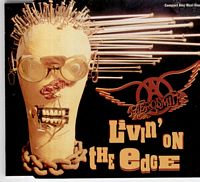Livin' on the Edge
| "Livin' on the Edge" | ||||||||
|---|---|---|---|---|---|---|---|---|
 |
||||||||
| Single by Aerosmith | ||||||||
| from the album Get a Grip | ||||||||
| B-side | "Don't Stop"/"Can't Stop Messin'" | |||||||
| Released | February 23, 1993 | |||||||
| Format | Cassette, CD | |||||||
| Recorded | 1992 | |||||||
| Genre | Hard rock | |||||||
| Length | 6:07 (album version) 6:21 (full version) |
|||||||
| Label | Geffen | |||||||
| Writer(s) | Steven Tyler, Joe Perry, Mark Hudson | |||||||
| Producer(s) | Bruce Fairbairn | |||||||
| Aerosmith singles chronology | ||||||||
|
||||||||
|
||||||||
"Livin' on the Edge" is a song by American hard rock band Aerosmith. The song was written by Steven Tyler, Joe Perry, and Mark Hudson. It was released in 1993 (see 1993 in music) as the first single from the band's commercially successful album Get a Grip. The single reached #18 on the Billboard Hot 100 chart, #3 on the Cash Box Top 100, and #1 on the Billboard Album Rock Tracks chart, where it remained for nine weeks, making it Aerosmith's most successful single on that chart. In the UK, the song peaked at #19 on the British pop chart in April 1993.
The song is one of Aerosmith's most successful attempts at tackling social issues. It reflects on the sorry state of the world ("There's something wrong with the world today"), religion ("We're seeing things in a different way and God knows it ain't his"), racism ("If you can judge a wise man by the color of his skin"), among other things. However, the lyrics in the song also suggest that the world is still worth living in ("We could tell 'em no, or we could let it go, but I would rather be a-hangin' on"). The lyrics also contain a reference to the Yardbirds song, "Mister, You're a Better Man Than I" (Aerosmith had previously recorded a version of a song popularized by the Yardbirds, "Train Kept A-Rollin'"). It is also considered another anti-conservative message with the lyrics "There's something right with the world today, and everybody know's it's wrong."
According to the band's autobiography Walk This Way, the song was inspired by the Los Angeles riots of 1992. Steven Tyler also mentions in the book, that the song features the sound of a bass drum he stole from his high school; four loud beats are heard from that drum in a pause between the final verse and chorus.
...
Wikipedia

